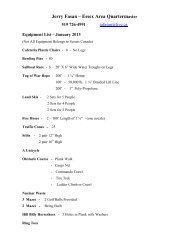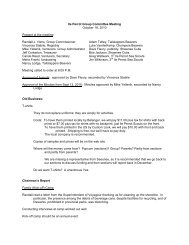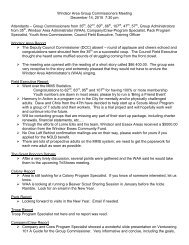Beaver Leader's Handbook - Scouts Canada
Beaver Leader's Handbook - Scouts Canada
Beaver Leader's Handbook - Scouts Canada
Create successful ePaper yourself
Turn your PDF publications into a flip-book with our unique Google optimized e-Paper software.
BEHAVIOUR AND DISCIPLINE<br />
(See also Duty of Care in Chapter 2)<br />
<strong>Beaver</strong> leaders always think about discipline. Without it, programs dissolve into chaos, fun disappears,<br />
and sometimes people get hurt. The challenges you face include: how to establish and<br />
maintain a necessary degree of control, when and how to intervene in a difficult situation, and<br />
how to encourage acceptable behaviour in positive ways.<br />
Sit down with your leadership team and fully discuss the areas of discipline and cooperation.<br />
Ask yourselves a number of questions.<br />
“What is Discipline?”<br />
In short, discipline is self control. It comes from much practise and experience – something<br />
<strong>Beaver</strong>s are learning from family and exposure to school. Helping children develop discipline is<br />
different from being a disciplinarian, just as having authority is different from being authoritarian.<br />
Using positive reinforcement rather than threats or force, you can let children know<br />
what you expect from them, and encourage appropriate behaviour.<br />
“What Behaviour Do We Expect From this Age Group?”<br />
Keep in mind the age characteristics and limited experiences of five to seven-yearolds.<br />
Let <strong>Beaver</strong>s know exactly what you expect of them, and make sure both<br />
they and you follow through on these expectations.<br />
Routines are extremely important for young children. They offer security and<br />
a way of dealing with reality. For example, if you read a child a favourite<br />
story and skip a word, the child quickly points out your mistake. Children are<br />
not being picky here; it’s just that you have altered their sense of the world,<br />
and they wish to make it right. Skipping an opening or closing ceremony or<br />
other colony routines also creates confusion, and your <strong>Beaver</strong>s may not be<br />
able to settle down again until you do the missed routine.<br />
Children also need time to adjust from one routine to the next. If you suddenly rush <strong>Beaver</strong>s,<br />
they may lose their sense of self-control and reality, and try to fight against whatever is causing<br />
the confusion. Because their power to verbalize or deal mentally with frustration is not well<br />
developed, they may resort to physical misbehaviour. This is how they blow off steam and try<br />
to regain control, or draw attention to their problem. Although it may take you great effort<br />
and patience, try to stay calm and show that you really care by helping <strong>Beaver</strong>s explain their<br />
concerns and find positive solutions.<br />
Before moving on to the next activity, announce the change well in advance. This gives children<br />
time to clean up or complete the present activity, and to start mentally shifting to the next program<br />
routine.<br />
Simple rules help retain order. <strong>Beaver</strong>s soon learn that their actions have consequences. If<br />
they’re ignoring a rule and causing disruption, stop the colony program. Explain the proper routine,<br />
ensure they understand and will follow it, then begin the program again.<br />
“How Can We Influence Behaviour?”<br />
A well planned program gives a feeling of confidence to both <strong>Beaver</strong>s and leaders. Most experienced<br />
leaders will tell you that discipline is more an attitude than a technique. When you feel<br />
in control of a situation, you convey this feeling to the <strong>Beaver</strong>s. On the other hand, if you’re<br />
unprepared or unsure of your role or abilities, you pass along these feelings. Confidence makes<br />
it easier to exercise authority.<br />
6-5








